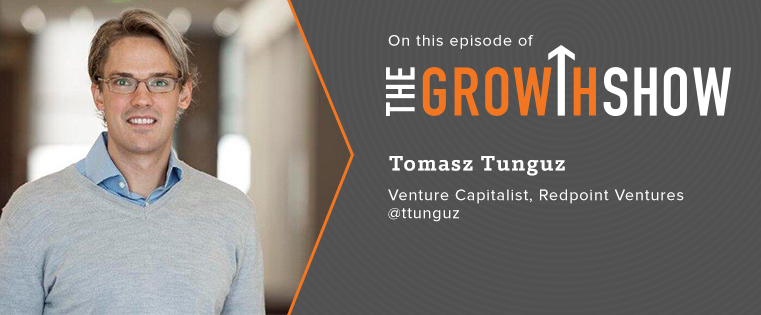

Content marketing is a little bit like a bank account where you get the benefits of compounding returns.
- Tomasz Tunguz
Tomasz Tunguz is a partner at Redpoint Ventures and former Product Manager at Google, best known for his data-driven blog posts on the key questions facing startups, including fundraising tips, startup benchmarks, management best practices, and team building insights. Almost all of his writing and thought leadership is centered around one key theme: How can you grow faster?
Recently, Tunguz joined HubSpot CMO Mike Volpe on The Growth Show to chat about why he takes the time to blog everyday, the compounding returns of content marketing, and two things that can help almost any business grow faster. Below is an excerpt of their conversation. If you'd like to listen to it in full, listen to the podcast on iTunes.
Q: You have quite a successful career as a VC, but you blog almost daily. Why do you bother blogging? Don’t you have way more important things to do?
A: There are two main reasons. First, I wanted to find a way to differentiate myself in the ecosystem. The venture world has become increasingly competitive and I thought that blogging might be one way to do that. I hold Fred Wilson and Chris Dixon in high regard -- they had both broken out doing that -- so I wanted to see if I could do the same.
Content marketing is a little bit like a bank account where you get the benefits of compounding returns. Little by little traffic has been growing. As a result, brand recognition for the firm has been growing, it's helped lead me to conversations like these, and overall I think it’s been incredibly valuable.
Second, I was getting a lot of questions from entrepreneurs like “Hey what should these metrics be,” or “What are other companies doing?” I was running the analysis myself and sharing it with the entrepreneur who asked the question, but then I thought it might be a whole lot more helpful to share my analysis with the ecosystem. That way, everyone could benefit.
Q: You’ve written about the key benefits of content marketing. I wanted to zone in on one part of it: the compounding factor. You see that half of the page views for a typical blog post come after the day that you publish it. Why do you think that is?
A: Typically what you are going to see when you start a content marketing campaign is that the first day you are going to see 20 visits (for example) and things will start to grow linearly. What you’re really hoping for is that at some point, you have this moment where all of a sudden you have tons of traffic. The way to do that is by training people to come back and informing as many different people as possible that you have something valuable to say.
When I did the analysis that showed that more than half of the traffic to posts on my site come afterwards, that’s an indicator to me that what you really want to be writing is content that has value over extended periods of time. That way, it's going to appear in search results and get people to come back. Evergreen content is what will make sure people keep coming back, helping you build a following and a business.
Q: If you had to boil down your entire blog into a single piece of advice on growth for entrepreneurs, what do you think it would be?
A: Churn matters almost more than any other metric. That is the single biggest determinant of a businesses' capital efficiency and how quickly it can grow. Think of it like you are filling the bucket and the bucket isn’t leaking at the bottom. It also tells you a lot of other things about the business, like there’s really good product/market fit, the users really value the product, and you're creating a sustainable and defensible business.
Q: One of the other keys to growth that you talk about is the importance of getting cash upfront. Why does that actually matter and how does it impact growth?
A: If you get an annual prepayment, basically what’s happening is your customer is lending you money to grow for free. That’s unbelievable. Typically in order to get cash, a founder has to go and raise equity that’s dilutive. A venture investor is going to buy some fraction of the company in exchange for cash.
If you can "borrow" money from your customers to help your business grow, you’re going to grow significantly faster. You’re also going to have a lot more predictability in your business because you’re not waiting until the end of each month to know whether or not a customer is going to renew and whether or not they are going to pay you. To get all of the money upfront, you get a lot more predictability in your business and you're basically financing your growth for free.
Click here to listen to the full interview with Tomasz Tunguz and subscribe to future episodes.


![How Often Should You (or Your Company) Blog? [New Data]](https://blog.hubspot.com/hubfs/how often should you blog (external research)_featured.png)
![19 Types of Blogs that Make Money in 2024 [+Examples]](https://blog.hubspot.com/hubfs/blogs-Jan-05-2024-05-12-25-3281-PM.png)
![The Top 3 Reasons Consumers Read Blogs & How to Attract Them in 2024 [New Data]](https://blog.hubspot.com/hubfs/202_Reasons-Consumers-Read-Blogs.png)




